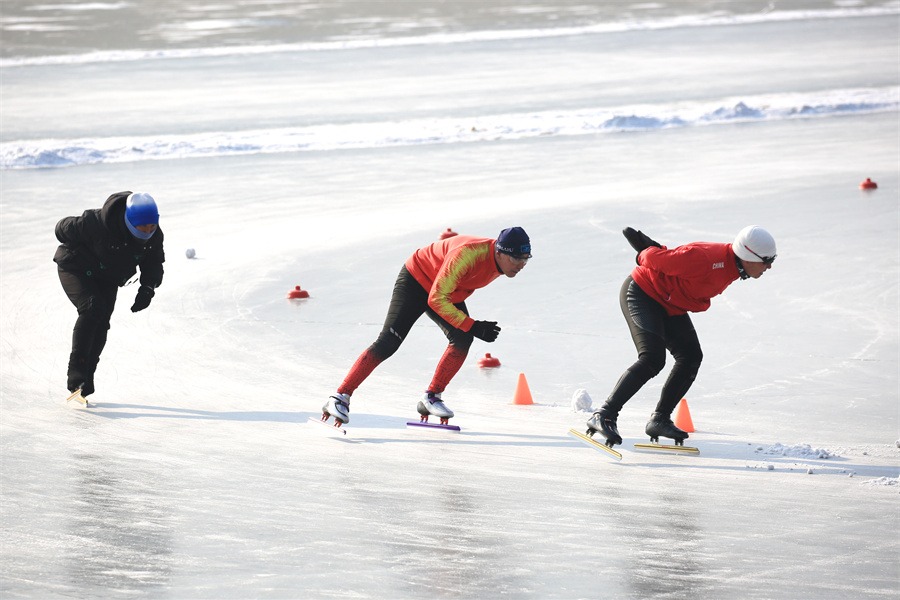Lessons well learned

Former Rwandan ambassador says China can play a big role in African development because of existing economic bonds
Rugaba Silas believes that the Chinese growth model is the best fit for African nations as it stands for economic success without compromising national interest.
"China's development mode is a model worth emulating," says Silas, the former Rwandan ambassador to China.
 |
| Former Rwandan ambassador Rugaba Silas says China's development mode is worth emulating. PROVIDED TO CHINA DAILY |
"Most of the Western growth models are highly individualistic and does not include overall welfare of the country. What sets China apart from the rest, is that when it makes investments, it always thinks of the country and its people first. In that sense the Chinese are more patriotic than anyone else, in the world," he says.
"Rwanda should take a page out of the Beijing growth model and use it to further its relations with the rest of the world. The African nation already has strong bonds with China and the two sides should work to improve this further."
Unlike the limited or scattered knowledge about China that exists among most of the African policy makers, Silas has in-depth and intimate knowledge of China and the progress it has achieved since the 1970s.
"My first encounter with China was in the late 1960s, during interactions with some agricultural experts from Taipei," he says.
"When official ties between China and Rwanda were established in 1971, the Chinese government sent a team of specialists to work in the Rwandan paddy rice, tea and sugarcane cultivation programs. Not only were the Chinese officials extremely competent and skilled in their respective professions, they were also conspicuous in their ubiquitous blue uniforms. Though they were very few in number, they were endearing, knowledgeable and extremely open to every one."
Silas says his real insight began in 1995 after he became Rwanda's first ambassador to China and the Democratic People's Republic of Korea. "The first lesson about China that I learned as from the totally urban landscape in Beijing," he says.
"It was an important lesson as it made me aware of the massive steps taken by China to become a developed economy. At the same time, I also realized that such strides were next to impossible for most of the African nations."
Silas says that after the 1994 mass genocide in Rwanda, there was an air of mistrust among most Western nations for his country. "Beijing was one of the first nations to recognize us after the genocide and also the last and first nation out and in of Kigali during the genocide," he says.

"China had at that time reiterated that the genocide was in no way a reflection of the Rwandan government policy. It was also one of the reasons why China was the first nation to return to Kigali after the massacre. This was indeed a significant gesture as there is an old saying in Rwanda that the first friend coming back after a ruin is the best one," he says.
Many other Western countries took a long time to recognize the new government and the new diplomatic missions. Countries like France recognized the new government after more than two months, he says.
"Our life in Beijing was simple and not at all expensive," Silas says, adding that his salary was extremely low as Beijing was one of the cheapest cities in the world to live in at that time. "It was ranked even lower, in terms of living costs, than Rwanda's neighbor Burundi,"he says.
Silas says that his primary task in Beijing was to step up bilateral cooperation in agricultural technologies, especially in irrigation and soil erosion prevention technologies.
"Though I made significant progress on this front, the Rwandan government reprioritized its reconstruction schedule and shifted focus to infrastructure and security," he says, adding that the present Rwandan Army Chief had done most of his training from China.
Apart from official ties, Silas says he was also tasked with promoting business ties between Chinese and Rwandese companies, something on which he did not enjoy much success.
"Though I took the initiative to ease the visa policies between the two nations, I realized that most of the Chinese businesses that came to Rwanda were either restaurants or those engaged in the export and import of commodities.
"This was something that was not on expected lines," he says as several other projects were discussed or proposed with Chinese businessmen in Beijing. "Most of them had evinced keen interest in these projects, but none of them actually ended up coming to Rwanda," Silas says.
"For instance, I have always wondered as to why there are no Chinese investors in our textile industry, a sector that is of great importance to the local economy.
"Some of the Chinese investors did not even bother to tell us the reasons for not proceeding with the investment."
"Before I came back to Rwanda, I had gone to Tianjin to hold talks with a bus company for an urban transportation development project," he says. "But after a visit to Rwanda, the company never came back to us."
He says that one of the reasons why most of the investors have been wary of investing in Rwanda at that time was due to the limited investment potential.
"All of that has changed after Rwanda joined the EAC and there are now several good investment options. We have a single market of five countries and a total population of 120 million people," he says, adding that this should help attract more Chinese investment.
Silas says that Chinese investment is crucial for his country's development, as Rwanda has learnt from experience that it is difficult to adopt most of the cutting-edge Western technologies in Africa. "The Chinese skills are closer and more suited to our demands."
After his diplomatic tenure, Silas became a member of the Rwandan parliament and has looked to further relations with China in his new role.
"Joint ventures with local entrepreneurs are the most sustainable way for both sides to further ties," he says.
"It's normal for African nations like Rwanda to deepen their ties with China. While most of the traditional donors are focused on financial aid, China is keen on improving technology and education in Rwanda.
"The relations between Rwanda and China could be termed as a real partnership because, in a sense, both sides are willing to share with each other," he says.
Silas says that two of his children are settled in China, one in Beijing and the other in Shenzhen. Both of them are working with organizations that are looking to attract more Chinese entrepreneurs to Africa, especially Rwanda.
"I was sad when my father chose Beijing in 1995 over better options like France or the US," says Norbert Haguma, Silas' second son.
"Beijing was a totally strange place and unlike any other capital. My distaste even went to the extent of not learning Chinese," he says.
"But later in 2000 when my mother asked me to go to France for college education, I refused after careful consideration. I realized that I would rather live in a developing country that is making progress day by day, and more importantly use that experience to do something tangible for my own country," Haguma says.
Today's Top News
- AI curbs show Biden's rejection of cooperation: China Daily editorial
- Global medical minds unleash hospital innovation trends
- Xi holds phone talks with Vietnam's top leader To Lam
- Chinese, Sri Lankan presidents hold talks in Beijing
- Xi's article on further deepening reform comprehensively to be published
- China-UK dialogue outcomes will enable them to reboot relationship






























